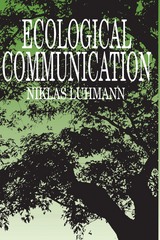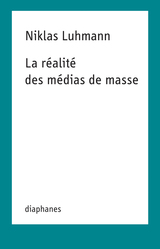
Luhmann extends the concept of "ecology" to refer to any analysis that looks at connections between social systems and the surrounding environment. He traces the development of the notion of "environment" from the medieval idea—which encompasses both human and natural systems—to our modern definition, which separates social systems from the external environment.
In Luhmann's thought, human beings form part of the environment, while social systems consist only of communications. Utilizing this distinctive theoretical perspective, Luhmann presents a comprehensive catalog of society's reactions to environmental problems. He investigates the spheres of the economy, law, science, politics, religion, and education to show how these areas relate to environmental issues.
Ecological Communication is an important work that critically examines claims central to our society—claims to modernity and rationality. It will be of great importance to scholars and students in sociology, political science, philosophy, anthropology, and law.


Niklas Luhmann is one of the greatest of contemporary social theorists, and his ultimate aim is to develop a conceptual vocabulary supple enough to capture what he sees as the unprecedented structural characteristics of society since the eighteenth century. Ours is a society in which individuals can determine their own sense of self and function rather than have that predetermined by the strict hierarchy of former times, and a key element in the modern sense of individuality is our concept of love, marriage, and lasting personal relationships. This book takes us back to when passionate love took place exclusively outside of marriage, and Luhmann shows by lively references to social customs and literature how a language and code of behavior were developed so that notions of love and intimacy could be made the essential components of married life. This intimacy and privacy made possible by a social arrangement in which home is where the heart is provides the basis for a society of individuals—the foundation for the structure of modern life. Love is now declared to be unfathomable and personal, yet we love and suffer—as Luhmann shows—according to cultural imperatives.
People working in a variety of fields should find this book of major interest. Social scientists will be intrigued by Luhmann’s original and provocative insights into the nature of modern marriage and sexuality, and by the presentation of his theories in concrete, historical detail. His work should also be capital for humanists, since Luhmann’s concern throughout is to develop a semantics for passionate love by means of extensive references to literary texts of the modern period. In showing our moral life in the process of revising itself, he thereby sheds much light on the development of drama and the novel in the seventeenth and eighteenth centuries.
READERS
Browse our collection.
PUBLISHERS
See BiblioVault's publisher services.
STUDENT SERVICES
Files for college accessibility offices.
UChicago Accessibility Resources
home | accessibility | search | about | contact us
BiblioVault ® 2001 - 2024
The University of Chicago Press









